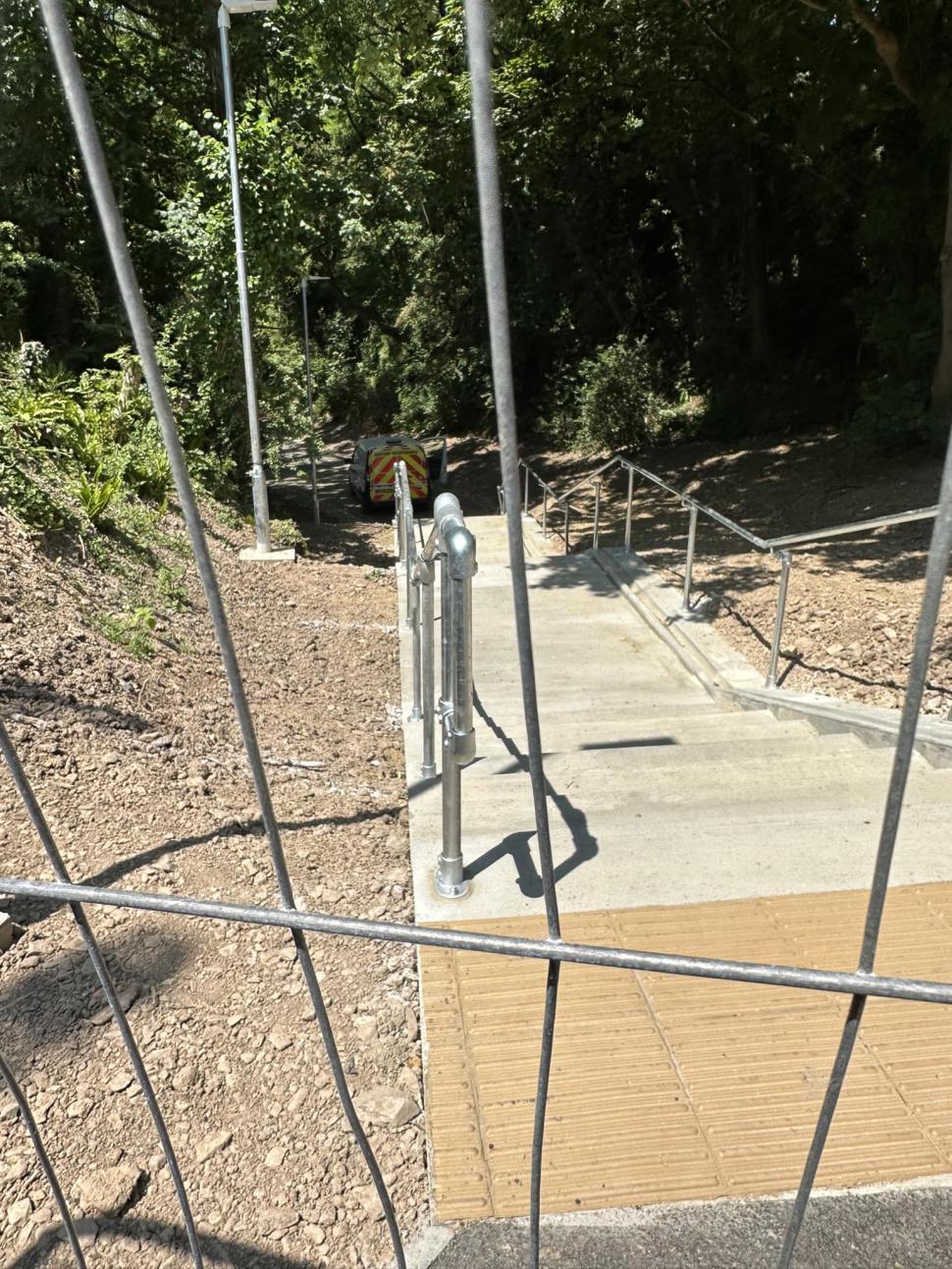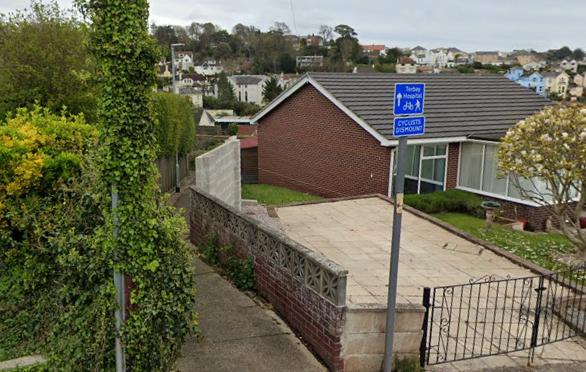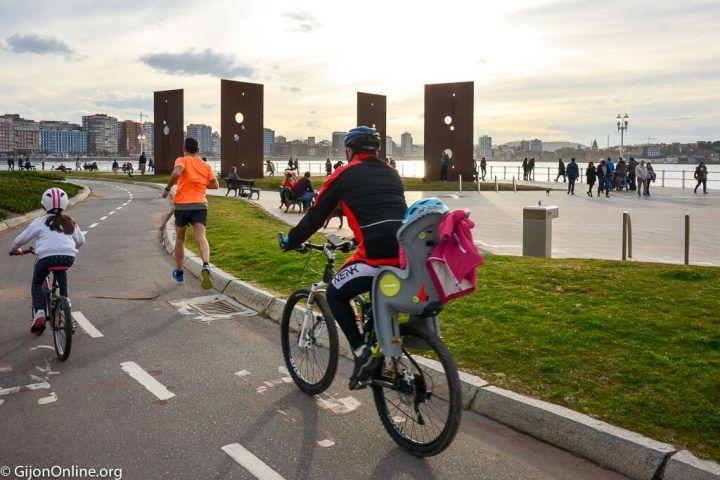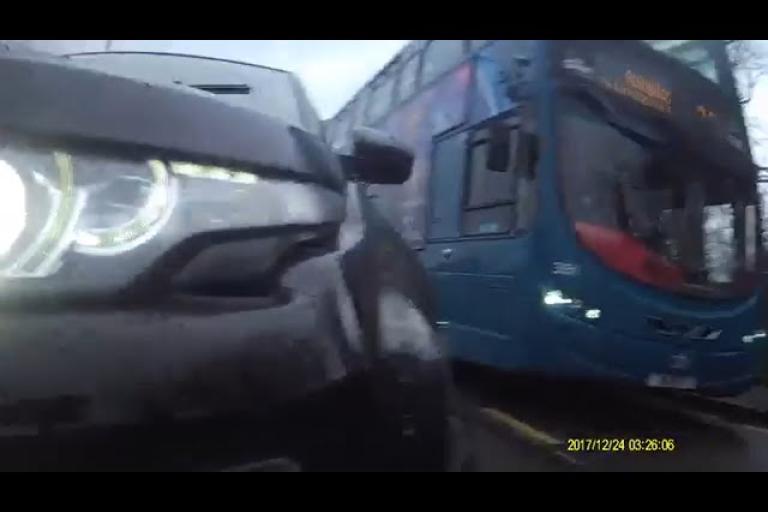- News
- Reviews
- Bikes
- Components
- Bar tape & grips
- Bottom brackets
- Brake & gear cables
- Brake & STI levers
- Brake pads & spares
- Brakes
- Cassettes & freewheels
- Chains
- Chainsets & chainrings
- Derailleurs - front
- Derailleurs - rear
- Forks
- Gear levers & shifters
- Groupsets
- Handlebars & extensions
- Headsets
- Hubs
- Inner tubes
- Pedals
- Quick releases & skewers
- Saddles
- Seatposts
- Stems
- Wheels
- Tyres
- Tubeless valves
- Accessories
- Accessories - misc
- Computer mounts
- Bags
- Bar ends
- Bike bags & cases
- Bottle cages
- Bottles
- Cameras
- Car racks
- Child seats
- Computers
- Glasses
- GPS units
- Helmets
- Lights - front
- Lights - rear
- Lights - sets
- Locks
- Mirrors
- Mudguards
- Racks
- Pumps & CO2 inflators
- Puncture kits
- Reflectives
- Smart watches
- Stands and racks
- Trailers
- Clothing
- Health, fitness and nutrition
- Tools and workshop
- Miscellaneous
- Buyers Guides
- Features
- Forum
- Recommends
- Podcast
news
Cyclists blast new cycling “stairway to A&E”... seemingly “commissioned by Danny MacAskill”; Plans to “dismantle” cycling infrastructure in Spanish cities an act of “political revenge”; Jonas Vingegaard’s ‘acting’ debut + more on the live blog
SUMMARY
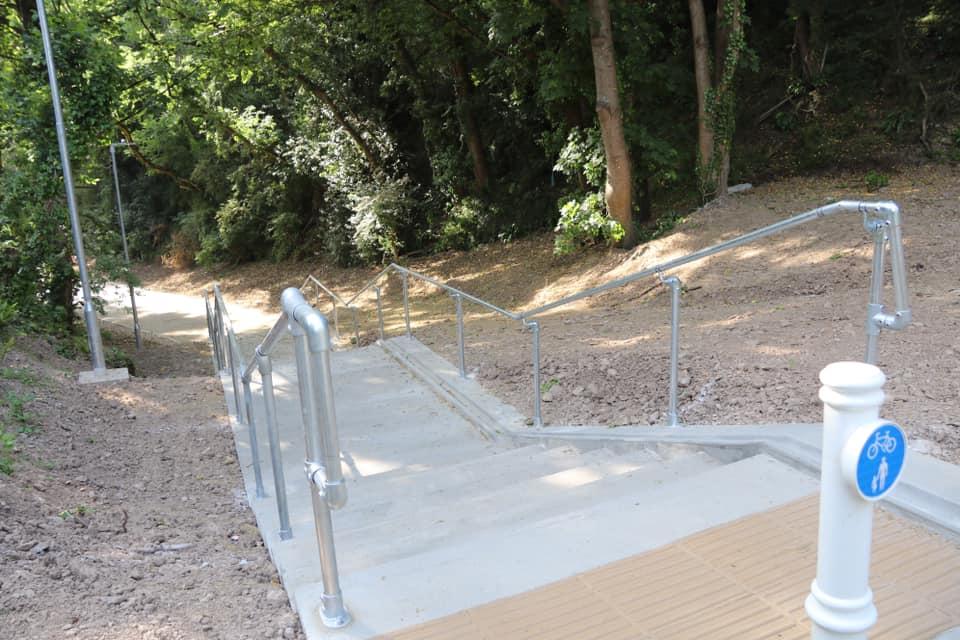 Cycling staircase, Plymouth (Brian Taylor, Facebook)
Cycling staircase, Plymouth (Brian Taylor, Facebook)21 June 2023, 10:53

“Maybe the councillors would like to demonstrate how wonderful their new piece of cycling infrastructure is on the opening day”: Plymouth cyclists blast cycling staircase “commissioned by Danny MacAskill”
Now, when we say that more cycling infrastructure is needed in our towns and cities, I’m not sure this is exactly what we had in mind…
The installation of a new, what can only be described as a cycling staircase in Plymouth, forming part of the Saltram Meadow to Colesdown Hill cycle path, hasn’t gone down too well with local riders, who have branded it a “stairway to A&E”.
“That’s even worse than I imagined,” wrote Alan on the Plymouth Cycling Campaign Forum Facebook group, while Pete pondered whether “the councillors would like to demonstrate how wonderful their new piece of cycling infrastructure is on the opening day”.
William also noted that Plymouth City Council had initially “boasted about how the route would benefit wheelchair users and mobility scooter users”, while others pointed out that the local authority had missed a few tricks even when implementing the stairs.
Apparently, revolutionary concepts like that are too difficult for them to grasp
— 🚲 Will - @WilliamNB [at] toot.bike 🇿🇦🇬🇧 (@WilliamNB) June 21, 2023
“There should at least be a groove on both sides to wheel a bike up and down in,” says Keith. “I can only see one on the left. Most people will have a bike to their right when they are walking with it so it will be very hard for most people to push a bike up that groove.”
“I had a chat with the guys building it one day when I was out riding and even they said it was madness,” added Steve. “They have however left a lovely sloped bank alongside which is presumably where people will actually ride.”
"cycling infrastructure" if you are Danny MacAskill 🙄
— Bill Hulley (@billhulley) June 21, 2023
Meanwhile, over on Twitter, some suggested that this new piece of ‘cycling’, ahem, ‘infrastructure’ (I use both those terms loosely) must have been designed by none other than Danny MacAskill himself.
Which is the only explanation that makes sense, really…
Of course, this isn’t the first questionable cycling staircase to grace Devon’s cycle routes.
> Warning signs to be placed at “crazy” cycle route steps after 83-year-old injured in horror fall
Last June, we reported that warning signs were put in place at the entrance to a bike path in Torquay which contains a flight of steps, after an 83-year-old cyclist suffered multiple injuries after falling while walking his bike down the steep descent.
The path, which runs behind Torre Station through Torquay woodland, cost £350,000 to build and includes a steep flight of steps where cyclists push their bike through a gulley while climbing or descending the 30 steps.
It was opened in 2016 to offer riders a route away from the busy main road. Original sketches for the cycle route showed a gentle slope through the trees, but a 60-metre set of steps was built instead.
The controversial steps were criticised almost immediately by prominent local cyclists such as the late Ken Robertson, forcing the council to admit that the steep mid-route staircase was “not an ideal solution”.
Apparently it seems that the councils in Devon are yet to stumble upon that ideal solution, then. Best leaving it to the cyclists to stumble up the steps, I suppose…
21 June 2023, 16:07
“Looks fine to me”: Readers react to Danny MacAskill’s cycling stairway
It seems that Danny MacAskill’s – sorry, I mean Plymouth City Council’s cycling stairway has divided opinion over on Twitter, between those who don’t see the problem with the new piece of cycling infra:
What’s wrong that’s how they look in Europe with a specific cycle “path” cut in to the stairway.
— alium (@strollingby) June 21, 2023
What would your solution be? A series of switch-backs cutting a huge bank into the nice greenery, plenty of foot bridges have this arrangement with a groove to push your bicycle up.
I'd accept a moan from a disabled person, but an able cyclists 🙄 get over yourself.— Tom Wykes (@TomWykes1) June 21, 2023
There is a guide track on the right for pushing your bike up/down the steps. What is the issue? perfect solution given the large change in levels.
— BigCityNights (@SixStringStingz) June 21, 2023
And those who see lots of problems with it:
Some cyclists (possibly me included, with a heavy ebike) would struggle to use the tiny ramp. Others using wheels to aid their mobility certainly would. Then there’s those with walking aids, pushchairs, wheelchairs, mobility scooters, tagalongs, trailers, cargobikes: just wtf?
— Philippa Clark (@clark_philippa) June 21, 2023
Those guide tracks are never far enough away from the railings to stop your pedals getting struck. Better if the groove was in the centre of the stairway [seen this abroad]
— RobbieC...🚴♂️🌊☔️🚉 (@dahontr3) June 21, 2023
Only a non cyclist would consider that piece of active travel infrastructure acceptable
— Steve Western (@IlminsterSteve) June 21, 2023
The there’s the kind of cyclist who simply views it all as a potential playground…
That looks great fun to go down! Not sure much going up.
— Cllr Adrian Chapmanlaw 🔶 (@adechapmanlaw) June 21, 2023
Send it
— James Sutton 🇺🇦 (@Bimster29) June 21, 2023
Looks fine to me pic.twitter.com/PHL9lcxSm3
— Charles Cut More (@charlescuttmore) June 21, 2023
Is that you, Danny?
21 June 2023, 08:08
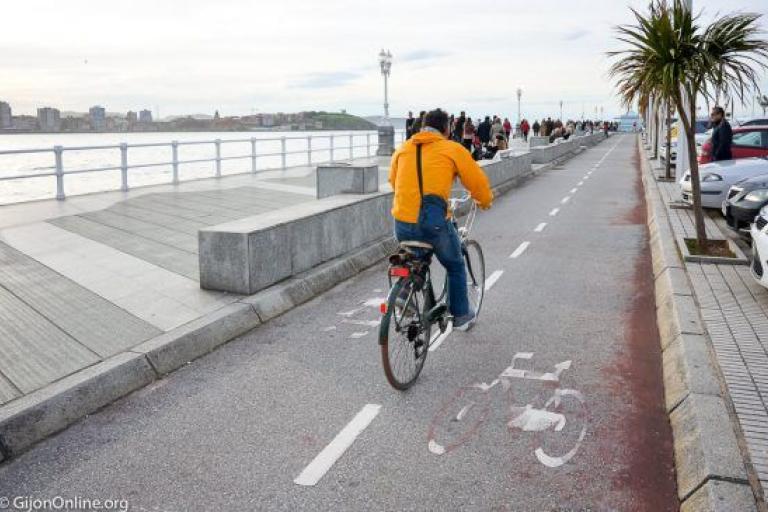
“We are going to harm the economy, the environment, and road safety so that some gentlemen can double park for 10 minutes a day”: Cyclists slam plans to “dismantle” and “eliminate” cycling infrastructure in Spanish cities as “political revenge”
Earlier this month, we reported that the right-wing coalition currently governing Italy was planning to impose a crackdown on cyclists in the country, by introducing legislation that would force people on bikes to wear helmets and carry licence plates and indicators, while also paying insurance.
(Of course, Lega’s Matteo Salvini, the Deputy PM behind the draconian proposals, quickly backpedalled on his plans as soon as a backlash came his way – as government ministers tend to do after coming up with point-scoring anti-cycling schemes.)
In Spain, another right-wing coalition has come under fire for its plans to immediately scrap cycle lanes and low emission zones in some Spanish cities, a move that critics say is inspired only by “political revenge and technical ignorance” and which will knock Spain “back to the 20th century”.
Some context: In last month’s regional and municipal elections, the Spanish Socialist Workers’ party (PSOE), which has governed Spain alongside the far-left Unidas Podemos alliance for the last four years, was on the receiving end of a drubbing, prompting prime minister Pedro Sánchez to call a snap general election for the end of July.
The results of last month’s elections, and the prospect of a new government being formed next month, has also led the conservative People’s party (PP) strike a coalition deal in a number of cities and regions with the radical right Vox party.
> Italy’s Deputy PM Salvini backpedals on number plates for cyclists
It’s this coalition that has moved rapidly to reverse Spain’s green agenda.
In Elche, in the Valencian region, three major cycleways in the city centre are due to be scrapped “as quickly as possible” – despite recently being funded by EU active travel grants – while the local government will also get rid of a low emissions zone which it says “attacks” the free circulation of cars.
“In addition to the fact that it is a meaningless decision because it eliminates the connectivity of the entire infrastructure, it would mean returning the money to the EU, having to pay a fine and, in addition, allocating municipal funds for dismantling. A delusion,” Esther Díez, the area’s mobility councillor until a few days ago, told La Politica Online.
“With the bike lane we have managed to reduce traffic pressure by 50 percent. We are going to see a an economic, environmental, and road safety setback so that some gentlemen can double park for 10 minutes a day.”
Trying to explain why the new right-wing coalition is “obsessed” with cycle lanes and “in a hurry” to eradicate them, Díez says: “I think that the focus is on the democratisation of public space. Conservative forces defend a model for a privileged few, in the social sphere and also in the urban sphere. They want a city that is designed exclusively for motor vehicles. They cannot tolerate that other forms of mobility have their space.”
The policies have also prompted protests from local cyclists, with a demonstration calling for the protection of the cycle lanes and road safety measures for people on bikes set to be held in Elche tomorrow night.
El próximo jueves, si estás en #Elche o tienes oportunidad de estar:
Gran BICIFESTACIÓN por el mantenimiento de los carriles bici y contra la #ViolenciaVial 🚴♂️🚴♀️🚴♀️
¡NO a la involución en #movilidadsostenible!#Bicifestacion22J
🗓22.06
🕢19:30
📍Parada Bicielx-Jesuitinas@ConBici pic.twitter.com/0XnIiHG6gg— Pedalibre (@pedalibre) June 20, 2023
Meanwhile, in Valladolid, at the new mayor’s first meeting in charge, he gave the instruction to repeal a LTN law, which he claimed made the city “stuck and chaotic”.
However, Darío S, a mobility technician and geographer at the University of Valladolid, claimed that the scrapping of the zero emissions areas is “a decision that no, I repeat, no mobility technician or specialist would take with the very positive results obtained”.
“It is only understood from political revenge and technical ignorance,” he said.
“A period of regression is opening in Spain in many areas, mobility is one of them, but the right thing will continue to be the right thing even if some only want to do politics for a minority. Change is unstoppable, whether it is ordered and scheduled or well forced and chaotic.”
> Research paper concludes that networking Seville’s cycle lanes helped improved cycle safety
In Gijón, a coastal city in north-western Spain, new mayor Carmen Moriyón announced that one of her first acts will be for cars to once again travel through the city “without any type of environmental label”, while restructuring the city’s road policies by dismantling the cycle network.
“From now on, vehicles will have absolute freedom of movement and parking on the streets and roads of Gijón,” Mariyón said.
Meanwhile, Díez describes these “backward” steps by the new local conservative regimes as “frustrating as it is worrying”, coming as they do at a crucial time for active travel and the fight against climate change.
“We are going back to the 20th century when we should be accelerating the transformations,” she says.
Worrying times, indeed.
21 June 2023, 15:29

Josh Tarling smashes elite men’s time trial, beating Fred Wright by over a minute, to become youngest ever British national TT champion
Whoah. In a brilliant advertisement for local club 10s everywhere, Ineos Grenadiers rider Josh Tarling absolutely smashed today’s elite men’s national time trial at the Croft Motor Circuit, beating Fred Wright by over a minute to become the youngest ever British champion in that most British of disciplines.
The 19-year-old, who has enjoyed a whirlwind start to life as a pro, finishing second behind Mads Pedersen in a time trial at the Etoile de Bessèges in February before becoming the youngest Paris-Roubaix starter in 86 years, has spent the last few weeks getting back to grips with the local time trial scene, setting himself up perfectly for today’s monstrous effort.
At t Bynea CC 50-mile time trial near Llandovery in Carmarthenshire last week, the 2022 junior world time trial champion took a whopping 57 seconds off the previous record time, covering the course in 1:35.26, just days after setting unofficial course records in two club 10s.
Alex Whitehead/SWpix.com
All that club time trialling – and a few months in the peloton, of course – proved the perfect preparation for today’s national champs. Tarling covered the 41.1km Dalton-on-Tees based course in a sensational 48.50, averaging over 50kph.
His nearest challenger, fellow classics man Fred Wright, was a whopping 1.03 behind, while bronze medallist, and Tarling’s Ineos teammate, Connor Swift finished 1.10 down. Of the 26 starters, only Charlie Tanfield and Ethan Vernon managed to finish within two minutes of the flying Tarling.
The kid’s got talent, alright. And now he’s got an elite time trial champion’s jersey to boot.
21 June 2023, 14:59
Get to grips with the new UCI rules — changes to look out for in this year’s Tour de France
It’s national time trial champs day today, which can mean only one thing – it’s almost time for the Tour de France!
And with cycling’s biggest race looming ever larger on the horizon, and to save you the hassle of doing it yourself midway through stage 10, road.cc’s Emily decided to flick through all 316 pages of the UCI’s rule book, to keep you up to speed with the latest raft of (entirely necessary, of course) tweaks from the pencil pushers in Aigle.
> Get to grips with the new UCI rules — changes to look out for in this year’s Tour de France
Thankfully, there have been no changes to maximum sock height this year, so you can put those rulers away…
21 June 2023, 14:39
Fancy riding your bike (fairly fast) and winning a pint of (alcohol-free) beer? Well, I’ve got just the event for you!
Yep, that’s right. This Saturday, the Watermill pub and restaurant in Dorking is joining forces with alcohol-free brand Lucky Saint to host its very own ‘Pint Pilgrimage’ for cyclists.
Overlooking the Surrey Hills and Strava favourite Box Hill, the Watermill will be the destination point for two rides – posted on the Lucky Saint’s Strava Club – including one hilly loop and a point-to-point course from Wimbledon to the pub, with both rides expected to take about two hours.
Following the ride, between 11am and 3.30pm on the day, the first 50 to show their completed Pint Pilgrimage Strava ride will be able to claim a pint of Lucky Saint, as well as a free 20-minute health check for their bike.
There will also be a competition on the day for the chance to win a £500 voucher to spend at Le Col.
Pints, cycling, and the potential for some cheeky summer spending, what’s not to like?
Aren’t most rides pint pilgrimages?
Liam Cook, General Manager at The Watermill said: “The Watermill really comes to life over the summer months, especially our glorious terrace which has undisrupted views over Surrey Hills. As we are only a stone’s throw away from the hills, it seemed like the perfect opportunity to bring together keen cyclists and Lucky Saint to help showcase our offer and champion the incredible area of natural beauty on our doorstep.
“Both of the cycling routes will end at The Watermill where we will be playing host to a whole cycling set-up, including an offer of a free Lucky Saint pint to cyclists and complimentary on-site bike health checks.
“We are looking forward to be able to bring this to Surrey and can’t wait to greet all the cyclists with that all important pint at the end of their route!”
21 June 2023, 14:26
21 June 2023, 13:58
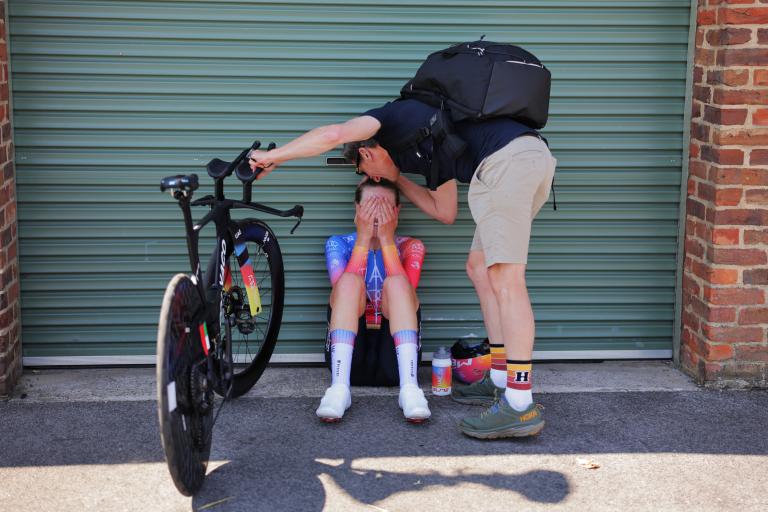
Lizzie Holden wins elite women’s British national time trial championships
After a few podium places and near misses over the years, 25-year-old Lizzie Holden has finally got her hands on a British champion’s jersey, taking the elite women’s national time trial title at the Croft Motor Circuit in Darlington this afternoon.
Alex Whitehead/SWpix.com
The UAE Team ADQ rider from Douglas covered the 27.4km course in 37.02 to beat Anna Morris and Elinor Barker by 14 and 16 seconds respectively.
.@lizzie_holden is crowned British women’s time trial champion at the Croft Circuit #NatRoadChamps pic.twitter.com/cGD9xIR8k2
— Ian Parker (@iparkysport) June 21, 2023
21 June 2023, 13:18
‘Did everyone double check the stats for today’s climbs? Yeah? Excellent’
Only in Belgium we have 1km long hills with a 91m height difference, a maximum slope of 8,6% and an average slope of 4,9%. (Infograph shown during broadcast of Saturday stage @belgium_tour).@OutOfCycling #cycling #statistics pic.twitter.com/C7IT0AwU3O
— Daam Van Reeth (@vrdaam) June 20, 2023
21 June 2023, 12:37
If local councillors were in charge of cycling’s iconic places...
Legendary cycling places that would smash with some improved infrastructure:
#3 Mount Ventoux pic.twitter.com/dYn10aVxo9
— Thymjan Arensman 🌿🍋🍊 (@ThymjanArensman) June 20, 2023
Legendary cycling places that would smash with some improved infrastructure:
#1 Paris Roubaix Velodrome pic.twitter.com/xxIluZzXDJ
— Thymjan Arensman 🌿🍋🍊 (@ThymjanArensman) June 20, 2023
Harsh, but true…
21 June 2023, 11:57
Language matters: Labour to redesign Brighton and Hove seafront scheme to ensure a “win-win-win for pedestrians, cyclists, and road users”
Yesterday, the new Labour administration in Brighton and Hove announced proposals for a new redesign of the A259 seafront road scheme – a project initially approved by the former Green-controlled council, on which construction was due to begin soon – which the party says will change the layout of the planned cycle lanes, in line with national standards, and maintain a two-way vehicle system to ensure the “the scheme keeps traffic flowing”.
It is our duty as your representatives to get this right whether you’re a cyclist, pedestrian or road user. We’re going to make sure it’s safer and better for everyone.
— Brighton & Hove Labour Party (@bhlabour) June 20, 2023
Announcing the plans, which will be examined by Brighton and Hove’s Transport Committee today, council leader Bella Sankey said: “Our announcement today has the potential to be a win-win-win for pedestrians, cyclists, and road users. We passionately believe in promoting walking and cycling in Brighton and Hove and delivering the highest quality, permanent, active travel infrastructure.
“We are also committed to retaining and maintaining key arterial roads for buses and motorists and we believe that our city deserves all of these things. We want our proposed redesign to serve all residents and make our beautiful and iconic seafront safer, fairer, and more accessible to all.”
Echoing Sankey’s statement, Brighton and Hove Labour’s Twitter account emphasised that “it is our duty as your representatives to get this right whether you’re a cyclist, pedestrian, or road user” – an interesting distinction also used by the council leader and picked up on by several cyclists on social media:
Pedestrians and cyclists ARE road users.
Where is the funding for all of this coming from? and what will happen to the money from @activetraveleng for the old scheme @bhlabour voted for a few months ago?
— Adam Bronkhorst (@AdamBronkhorst) June 20, 2023
We're ALL road users ferchrissakes! Not just people in dirty smelly ice powered vehicles!
— Dave Parsons (@Daveyraveyrgave) June 20, 2023
“Problem for active travel infrastructure in a nutshell. New political administration, cancels scheme about to be implemented, will redesign, re-consult, look for funding. ‘Win win’. The separation of pedestrians and cyclists from ‘road users’ gives an indication of what’s to come,” wrote Roger.
“It shows how language is important,” agreed Dr Robert Davis, the chair of the chair of the Road Danger Reduction Forum.
“Hey, Brighton and Hove Labour – if you want to be taken seriously, remember, pedestrians and cyclists ARE ROAD USERS.”
21 June 2023, 11:38
Judges told killing a cyclist now an 'aggravating factor' for driving offences, could lead to longer sentences
Cycling UK has welcomed the longer sentences “needed in some fatal driving cases” – though the cycling charity has also called for longer driving bans in other cases of careless and dangerous driving to “act as a deterrent and therefore help protect the public”.
Read more: > Judges told killing a cyclist now an 'aggravating factor' for driving offences
21 June 2023, 10:24
“Come on, those are the words of a cartoon villain”
Some reaction already to the shenanigans currently going on in some of Spain’s municipal governments:
Utterly grim what is happening to AT in Spain. Immensely frustrating that AT proponents have to fight tooth and nail for incremental gains and then some right wing chud can come in and undo it with the stroke of a pen.https://t.co/dFXmQyONsq
— Stew Elliott (@StewCElliott) June 21, 2023
“From now on, vehicles will have absolute freedom of movement and parking on the streets and roads of Gijón,”
I mean come on, these are the words of a cartoon villain.
— Stew Elliott (@StewCElliott) June 21, 2023
Gijon is not far from Bilbao where in ten days the @LeTour starts. We can't make this stuff up.
— Cllr Damian Haywood 💙 (@bigdamo) June 21, 2023
If only we could make it up…
21 June 2023, 09:58
What did we learn at the Dauphiné?
I didn’t learn anything at the Dauphiné, because I wasn’t invited along. Not that I’m bitter about it…
21 June 2023, 09:20
Don’t quit your day job, Jonas! Vingegaard makes ‘acting’ debut as Jumbo-Visma announce contract extension for Olav Kooij
I’m not sure Primož Roglič and Wout van Aert have anything to worry about in the Jumbo-Visma internal thespian stakes…
That’s at least judging by Jonas Vingegaard’s ‘acting’ debut (I’m being kind) in the Dutch team’s latest video, which was ostensibly made to announce that promising 21-year-old sprinter Olav Kooij – who was linked to a possible move away in order to secure more opportunities at the biggest races – has signed a new contract, tying him to Jumbo-Visma until the end of 2025.
Hi @olavkooij, we've got a message for you. 💌
Thank you for everything! 🙌 pic.twitter.com/z4lo5Uvf21
— Team Jumbo-Visma cycling (@JumboVismaRoad) June 21, 2023
In the clip, the 2022 Tour de France winner and teammate Christophe Laporte issue a heartwarming farewell message to their apparently outgoing teammate (a knowing nod to the rumours), before DS Merijn Zeeman – in a plot twist worthy of M. Night Shyamalan – steals the show by peering over the squad’s Alpine chalet to inform that “Olav is going nowhere!”
Gripping stuff, it truly is.
I don’t think the Oscars will be knocking at the door any time soon (or even the National Soap Awards, if we’re honest), but hey, at least it’s not another creepy AI-generated video or attempt to flog some NFTs…
> Jonas Cringegaard: Is this the weirdest contract extension announcement video you’ve ever seen?
After obtaining a PhD, lecturing, and hosting a history podcast at Queen’s University Belfast, Ryan joined road.cc in December 2021 and since then has kept the site’s readers and listeners informed and enthralled (well at least occasionally) on news, the live blog, and the road.cc Podcast. After boarding a wrong bus at the world championships and ruining a good pair of jeans at the cyclocross, he now serves as road.cc’s senior news writer. Before his foray into cycling journalism, he wallowed in the equally pitiless world of academia, where he wrote a book about Victorian politics and droned on about cycling and bikes to classes of bored students (while taking every chance he could get to talk about cycling in print or on the radio). He can be found riding his bike very slowly around the narrow, scenic country lanes of Co. Down.
Add new comment
15 comments

cmedred
|
1 year ago
0 likes
Didn't Spain just kill something like 120,000 people in that Covid-thing, a significant number of them because they were simply unfit? Forget the global warming debate, wouldn't Spain want to get people up and moving to save lives and cut down on the enormous costs of all the unfit who ended up in hospital but survived? Not to mention gaining the now well-documented benefit of a work force that spends more time working and less time out sick.


brooksby
|
1 year ago
4 likes
On the the Saltram Meadow to Colesdown Hill cycle path staircase - I'm really not sure that they've thought this through...
I can see one 'groove' for you to presumably wheel you bike up or down the staircase.
What happens when you meet someone coming up as you are going down? (or vice versa).
And what happens if your bike has panniers on it, or more than two wheels?



brooksby
|
1 year ago
2 likes
I was watching Points West (Bristol and south west local BBC news last night) and there was an interview with a Peter Walker of Pewsey.
The BBC article earlier in the year is here - https://www.bbc.co.uk/news/uk-england-wiltshire-64917169 - his wife was hit by a cyclist while crossing a road in 2016 and died in hospital the next day. An investigation at the time found no crime had been committed.
He claimed that the police had said that they couldn't do anything about a collision between a cyclist and a pedestrian (quoting the 1947 Road Traffic Act!?) and he is now campaigning for cyclists to be "treated the same as motorists".
I wonder whether the police had decided that the cyclist wasn't riding wantonly or furiously and so wrote it off as just one of those things (you know - the way that they do with motorists).
"The police didn't do anything as a cycle hasn't got a motor," said Mr Walker.
"And because of that they don't have to do anything."
Mr Walker said he had got "no further" on getting action taken since the DfT consultation concluded in November 2018.
"All I want is that if a pedestrian is killed by a cyclist, it is treated the same as any other motoring accident when a death occurs, that the police accident and investigation team have to be there on the spot immediately.
"If Diane had been hit and killed by a car in the high street in Pewsey there would have been a full police investigation."


It was also the one where they were stating he could prove the cyclist was going too fast because he saw he did strava. Of course the fact that no one had done the segments near the crash stretch at speeds faster then 28mph didn't come into it. Obviously the road should be driven to condition and not as fast as possible, but if a car was travelling less then the speed limit I doubt anyone would have mentioned they were travelling recklessly.

peted76
|
1 year ago
1 like
Wow Italy.. I sort of understand.. lurching from one right wing agenda to another probably filled with unfilfilled promises from election funding and corruption being so rife.. but Spain.. honestly with so much money coming into the country from tourism and cycling being a significant attraction in parts of the country, I thought they'd be a little more forgiving on active transport. The fact that they will have to pay back the EU grant just makes this even more baffling..


Wow Italy.. I sort of understand.. lurching from one right wing agenda to another probably filled with unfilfilled promises from election funding and corruption being so rife.. but Spain.. honestly with so much money coming into the country from tourism and cycling being a significant attraction in parts of the country, I thought they'd be a little more forgiving on active transport. The fact that they will have to pay back the EU grant just makes this even more baffling..
Er, I think the Italians changed their stance to it being fgor scooter users. Not sure if that meant small mopeds, or the things with small wheels you push along with one foot.


the little onion
|
1 year ago
7 likes
Vox aren't "radical right", they are the descendants of the Spanish far right. I'm normally cautious about labelling parties as "far right", but it does apply here.
anyway, there is a massive culture war in Spain right now, around a whole set of issues (gender, sexuality, agriculture, environmental regulation) and cycling is just one part of it.

Latest Comments
- PRSboy 2 sec ago
Sorry to read that, hope you're back out again soon! Sounds like you're an experienced rider and it was one of those things....
- The_Ewan 20 min 1 sec ago
Or only £8413 if you get it on a Cycle To Work scheme.
- chrisonabike 27 min 5 sec ago
I am not as confident as you on this one. At best ... I hope it would not be counter-productive....
- Jimmy Ray Will 52 min 34 sec ago
My understanding of speed in relation dangerous driving charges is that to be considered dangerous, the speed needs to be knowingly and objectively...
- quiff 1 hour 11 min ago
Sorry, total reading failure! Other thoughts stand though - every brand is charging you for the box one way or another.
- wtjs 1 hour 16 min ago
On a different note I've been wondering why my reports are taking longer for them to process recently...
- ribena 1 hour 18 min ago
Looks like a good approach to me....
- stonojnr 1 hour 27 min ago
So sad,its one of my local shops, literally cycle past it nearly every day....
- brooksby 4 hours 19 min ago
He needs to tell his friends and relations to stop using Signal, anyway… Or at the very least to RTFM.
